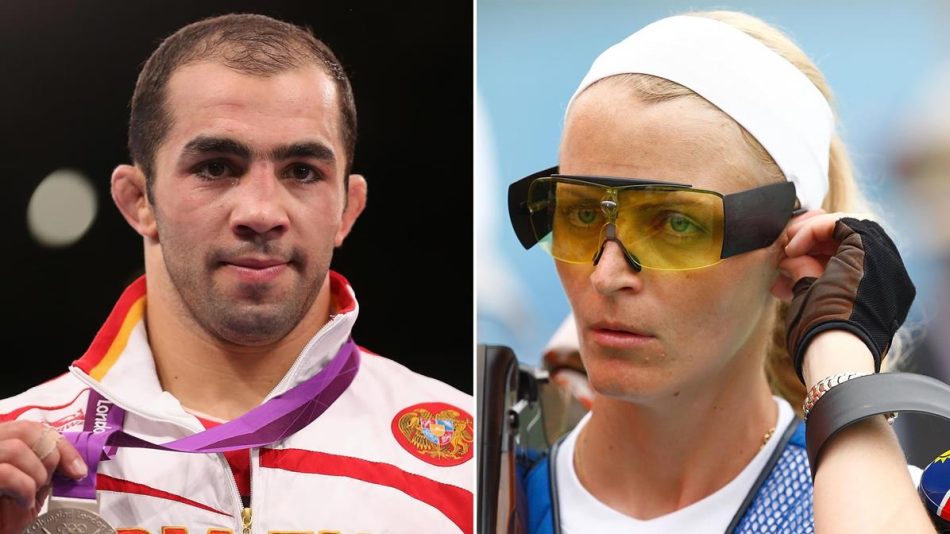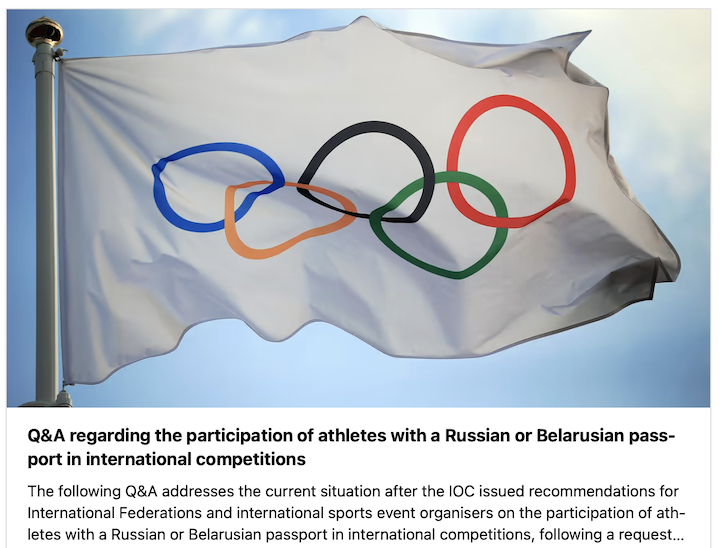Athlete representatives present their view in Council of Europe hearing on the participation of athletes with a Russian or Belarusian passport in international competitions

International Olympic Committee
25 Apr 2023 – The Parliamentary Assembly of the Council of Europe (PACE) held a hearing today on the participation of athletes with a Russian or Belarusian passport in international competitions. The International Olympic Committee (IOC) was invited to this event, and provided two Olympians with the opportunity to present their views on behalf of the athletes who elected them as their representatives.
Olympic silver medallist Arsen Julfalakyan from Armenia, who chairs the United World Wrestling (UWW) Athletes’ Commission, and Gaby Ahrens from Namibia, who competed in the sport of shooting at three editions of the Olympic Games and now chairs the Association of National Olympic Committees of Africa (ANOCA) Athletes’ Commission, addressed the parliamentarians.
Also invited from the Olympic Movement were Olympic discus champion Gerd Kanter (Estonia), who presented the view of the athletes from his region, and Francesco Ricci Bitti, President of the Association of Summer Olympic International Federations (ASOIF).
“As you know very well, unfortunately in Africa, we are very familiar with the issue of armed conflict between countries and within countries. That’s why this topic is very important to athletes in our continent as, for us in Africa, the issue of wars and armed conflict is not foreign,” Gaby Ahrens said.
She referred to the discussions of 100 athlete representatives at the Africa Athletes’ Forum last month, and quoted the resolution they agreed on: “Athletes should never pay the price of a conflict whatever it is and wherever it is. Politics should not put pressure on sport to withdraw from its fundamental values of solidarity and unity.” She concluded: “On behalf of athletes from Africa and our Commission, I would like to reiterate that athletes should never pay the price of a conflict their government is involved in.”
The situation in his home country, Armenia, and the conflict with neighbour Azerbaijan, were addressed by Arsen Julfalakyan: “I have never used my position in different international sports conferences or meetings to call for a total ban of the Azerbaijani athletes. And I’m not going to do that here either,” he said.
He pointed to the dozens of ongoing conflicts in the world right now, “with unfortunately way too many people suffering and dying. This was the case or still is in some countries such as Iraq, Yugoslavia, Libya, Syria, Yemen, Lebanon, Afghanistan and way too many others. Can anyone remember a case when all the athletes of a country were banned because of an armed conflict or a war?”
On behalf of ASOIF, Francesco Ricci Bitti outlined that process which led to the IOC recommendations to the International Federations and the strong stance the IOC took in February 2022 at the start of the invasion with the sanctions for the Russian and Belarusian governments, who are solely responsible for the war, and the unprecedented solidarity efforts of the Olympic Movement to help the Ukrainian athletes and members of the Olympic Community of Ukraine in order to have a strong Ukrainian team at the Olympic Games Paris 2024 and the Olympic Winter Games Milano Cortina 2026. Mr Ricci Bitti stressed that the International Federations are working on implementing the IOC recommendations: “We are confident that they will work,” he said.
Gerd Kanter agreed that the decision about the participation in international sports competitions should be made by sport, not by politics. He acknowledged that it is not a black or white decision, and explained that in his region it is felt that athletes with a Russian or Belarusian passport should not take part.
The Deputy Minister for Youth and Sports in Ukraine, Andriy Chesnokov, the Minister of Sports and the Olympic and Paralympic Games in France, Amélie Oudéa-Castéra, and Lucy Frazer, Secretary of State for Culture, Media and Sport in the United Kingdom, also addressed the parliamentarians at the PACE.
Alexandra Xanthaki, Special Rapporteur of the United Nations (UN) Human Rights Council in the field of Cultural Rights, repeated her concerns which she had already expressed in a letter to the IOC in September 2022. She said: “The continuing blanket prohibition of Russian and Belorussian athletes on the basis of their nationality violates the principles of universality and non-discrimination, two of the most fundamental human rights principles. Such a ban confuses states’ behaviours with individuals’ behaviour, something that international human rights law prohibits. Punishing individuals solely based on their nationality for the heinous acts of leaders over which they have no control undermines this distinction.”
She referred in her message to the IOC recommendations of 28 March 2023. These say that athletes with a Russian or Belarusian passport who actively support the war cannot compete, and also exclude athletes who are contracted to the Russian or Belarusian military or national security agencies.
Ms Xanthaki said: “I am of the view that such a recommendation is a step in the good direction. It also corresponds to my view that forced conscription alone, for example, would not be sufficient to deprive an athlete to compete.”
On behalf of France, host of the Olympic and Paralympic Games Paris 2024, Amélie Oudéa-Castéra explained: “France recognises and respects the autonomy of the sports movement and, where the Olympic and Paralympic Games are concerned, it is the IOC and the International Paralympic Committee (IPC) that will take, each in its sphere of responsibility, a sovereign decision concerning the participation of Russian and Belarusian athletes. But we, the political leaders, have to understand what in concrete terms this model of ‘neutrality’ may mean, and what its viability can be within the context we know. The IOC is working on this, and the IPC will be re-examining the question ahead of its General Assembly in September. The recommendations that the IOC made on 28 March do not apply to the Paris 2024 Games; at this stage, they have been issued to the International Federations only for international sports competitions. But they are already initial clarifications.”







